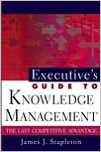| |||||
• polskie
• Zamów informacje o nowościach z wybranego tematu • kontakt |
EXECUTIVE'S GUIDE TO KNOWLEDGE MANAGEMENTSTAPLETON J.wydawnictwo: WILEY, 2003, wydanie Icena netto: Executive's Guide to Knowledge Management: The Last Competitive
Advantage Description A step-by-step guide for
turning information into advantage
Preface. Chapter 1: Infomentality. Your Infomentality. Intelligence-Gathering Mentality. Elements of the Intelligence-Gathering Mentality. Your Intelligence-Gathering Plan. Fear Accepted Wisdom. The Trap of Mundane Tasks. Conclusion. Chapter 2: InfoGoals. Simple Information Request. Understand the Source Information. Synthesize the Data. Disseminate the Knowledge. Act on the Knowledge. Update the Knowledge. What Businesses Need. Risks. The Ultimate Goal. Conclusion. Chapter 3: Building Knowledge. Choose Your Parameters Carefully. The Knowledge Advantage. The 10-Step Process for Building Useful Knowledge. Information Basics. Conclusion. Chapter 4: Intelligence Gathering. Why Information Gathering Is Important to Sales. Information Gathering as a Basic Skill. External Information Sources. Opinions. Aim of the Knowledge Management Program: Getting and Keeping New Clients. Basic Elements of Successful Information Gathering. What Does a Buyer Look For? Why Does a Buyer Seek a Particular Product or Service? When Does a Buyer Make Those Purchases? How Does a Prospective Buyer Choose Among Sources? Where Can You Find Contact Information? Who Should You Speak With? Conclusion. Chapter 5: Competitor Information. Your Competition: Colleagues or Enemies? Gathering Information on Your Competitors. Sources of Competitor Information. What You Should Know About Your Competition. Keep a Central Database. Conclusion. Chapter 6: Customer Relations. What Constitutes Good Service? What Do Customers Want? Communication. Surveys. Exit Interviews. Entry Interviews. Information Sources. Customer Base. Competing Through Knowledge. Misinformation. Conclusion. Chapter 7: Referral Source Information. The Art of Networking. The Right Knowledge. Successful Relations with Information Sources. Conclusion. Chapter 8: Infoplan. Why We Gather Information. Why You Must Plan. The Planning Process. Why Information-Gathering Plans Fail. Conclusion. Conclusion. The Future of Knowledge Management. The Last Competitive Advantage. Where to Find Additional Information. Appendix A: Information Associations. Appendix B: Sources of Information and Analyses. Index. 234 pages
Po otrzymaniu zamówienia poinformujemy pocztą e-mail lub telefonicznie, |


